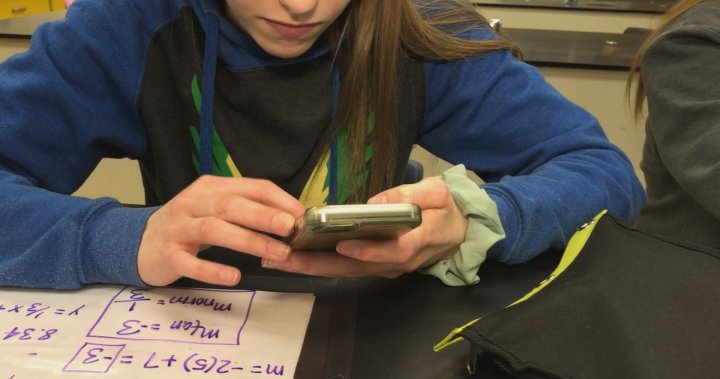As classroom cellphone bans arrive in multiple Canadian provinces — most recently Quebec and British Columbia — some students and officials are pondering whether or not a similar concept will be introduced in Nova Scotia.
As of January, all schools in Quebec are required to have a policy restricting the use of cellphones in classrooms. Last week, the British Columbia government announced new policies will be implemented by the start of the next school year to allow school districts to prohibit cellphone usage on school property.
Ontario introduced cell phone restrictions in 2019, making it the first province in Canada to take action against personal device usage in a classroom setting.
Elliot Boyd, a student at Halifax’s Citadel High, said he’d support action being taken to limit cellphone usage in a learning environment.
“From what I’ve seen in class personally, I think it definitely would be a benefit,” he said during a lunch break on Friday.
“Especially now, a lot of social media sites like Instagram, TikTok, really draw away students’ attention and I noticed a lot, most of the time generally, students will get drawn to their phones after about 20 minutes of work.”
He said a “ban on phones” could be beneficial as it would provide students with less distraction when completing their work, likely leading to higher grades overall.
Get the latest National news.
Sent to your email, every day.
Despite the support of one student, not everyone is in favour of banning cellphones outright at schools.
Sean Corbett-Ferguson, another Citadel student, said he wouldn’t support the move as some students have different learning methods that incorporate the use of phones.
“Some students work better with their phone for calculators and everything,” he said.
“For me, I sometimes get headaches in class. So, when I have a headache, I go on my phone for five minutes and then I go back to doing my work … I don’t think they should take them away.”
Other Citadel students were slightly more conflicted on the idea.
Jack Forester said he sees the “pros and cons” of phone usage in the classroom.
“The pros (are) you can log on and do schoolwork on your phone. But of course, some kids wouldn’t do that and go on their phone for other uses.”
Distraction or asset?
Ryan Lutes, president of the Nova Scotia Teachers Union, said teachers’ opinions on the subject differ depending on whether or not they incorporate cellphones into their lessons. For Lutes personally, he said the devices were a distraction during his tenure as a math teacher.
“It’s kind of all over the board. I think there are a large number of teachers who definitely think that cell phones in their classrooms are a distraction. I know when I was teaching, I certainly found that,” he said in an interview on Friday.
“But then, there are other teachers who use them for legitimate curricular purposes, which I think should be allowed. Teachers can use their professional judgment on how they’re used in classes.”
When asked if he would support a widespread ban on personal cellphone usage throughout Nova Scotia’s school system, Lutes was weary of what that process could look like.
“Sometimes political decisions don’t make good educational policy,” he said, adding that he thinks it would be necessary for the provincial government to receive consultation from teachers, school administrators, and parents before jumping to any type of legislative conclusion.
“We can’t just have political decisions be made and then fall to the feet of teachers. If we’re going to implement something, it needs to be well-thought educationally-sound policy, not just a political decision.”
Province responds
In response to a request for comment on the idea of banning cellphones in schools, Nova Scotia’s Department of Education and Early Childhood Development office said it is “carefully considering what actions best support Nova Scotia’s students and school staff” while monitoring developments in other locations in Canada and abroad.
“We know technology has the potential to support learning in the classroom, but it comes with risks including over-use, classroom disruption, and privacy concerns,” a statement from the province read.
“We will be discussing with teachers, administrators, school staff, parents/guardians, students, and other partners around the use of technology in classrooms.”
© 2024 Global News, a division of Corus Entertainment Inc.


